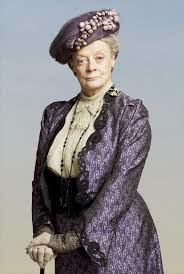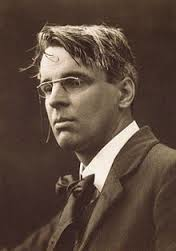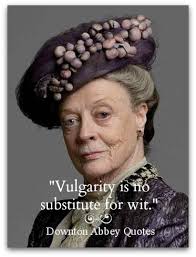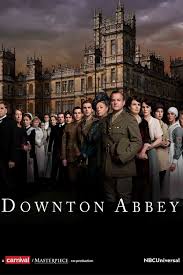All this thinking is highly overrated. Violet, Dowager Countess of Downton Abbey
As “Downton Abbey” continues through its sixth and final season here in the States, here are some thoughts from a few months ago from everyone’s favorite character . . .
The American showing of Masterpiece Theater’s Downton Abbey’s fifth season just ended, to the dismay of its millions of fans who now must wait until next January to get their next Downton fix. It’s a bit worse for Jeanne and me. Late last year Jeanne signed up to throw a few monthly dollars in the direction of our local PBS station; in return, we were shipped the full fifth season of the series in DVD at the end of January. The fifth season had just started its Sunday evening run a couple of weeks earlier, and now we had in our hands the rest of the season with no need to parcel the episodes out one week at a time. The DVDs showed up a couple of days before we got smacked with Juno, the first and worst of a series of winter storms that came in unrelenting succession over the next month. With Tuesday and then Wednesday classes cancelled, we binge-watched Lord Grantham along his relatives and homies cavort and angst through eight straight episodes—about eleven or twelve hours of viewing. And we wanted more.
All Downton fans have their favorite characters—I’ve noted in a previous post from a few weeks back that mine is Mister Carson, the erstwhile butler of the establishment.
 But everyone loves Lord Grantham’s mother Violet, the dowager countess and source of endless entertainment from meaningful glances to pithy retorts, a lovably manipulative force behind virtually everything going on in each episode with a wit as dry as a martini. Violet is played so memorably by Dame Maggie Smith that I cannot imagine anyone else being Violet (although I suspect Dame Judi Dench could do it, just differently). In this most recent season any number of Violet one-liners made me laugh, then think. Here are a few of them.
But everyone loves Lord Grantham’s mother Violet, the dowager countess and source of endless entertainment from meaningful glances to pithy retorts, a lovably manipulative force behind virtually everything going on in each episode with a wit as dry as a martini. Violet is played so memorably by Dame Maggie Smith that I cannot imagine anyone else being Violet (although I suspect Dame Judi Dench could do it, just differently). In this most recent season any number of Violet one-liners made me laugh, then think. Here are a few of them.
All this thinking is highly overrated. I blame the war. Before 1914 nobody ever thought.
Downton Abbey begins in 1912 with the sinking of the Titanic and in five seasons has proceeded through the Great War to the disturbing, iconoclastic years in the war’s wake, concluding the fifth season at Christmas 1923. In my twenty-plus years of teaching in an interdisciplinary humanities program, the most important thing I have learned about history is that no event ever changed the world so fully and irrevocably as World War One.  William Butler Yeats captured these dark transformations perfectly in his 1919 poem “The Second Coming.”
William Butler Yeats captured these dark transformations perfectly in his 1919 poem “The Second Coming.”
Things fall apart; the center cannot hold;
Mere anarchy is loosed upon the world,
The blood-dimmed tide is loosed, and everywhere
The ceremony of innocence is drowned.
The best lack all conviction, while the
Worst are full of passionate intensity.
That these lines are directly applicable to our world a century later is testimony to just how complete the changes were.
Violet finds herself in a world she does not understand in which none of the fixed and reliable rules that have given her life and society stability apply. There was a time when people knew their place, when one knew what to expect, when things made sense. That world is gone, and she blames it on too much thinking. She might have a point. Not long ago some philosophical wag wrote that “Socrates may have been right when he said that the unexamined life is not worth living, but the overexamined life is nothing to write home about either.”
A lack of compassion is as vulgar as an excess of tears.
 This is Violet’s comment to her granddaughter Mary when Mary shows a remarkable lack of concern for her sister Edith’s sadness and mourning over the death of her lover and father of her child. It is a remarkable comment from a woman whose whole life has been defined by the sort of British aristocratic reserve that looks, at least on the surface, like lack of compassion on steroids. But an excess of any sort on the spectrum of emotion is “vulgar,” perhaps the worst thing that could possibly be said about a British aristocrat in the post-Edwardian era.
This is Violet’s comment to her granddaughter Mary when Mary shows a remarkable lack of concern for her sister Edith’s sadness and mourning over the death of her lover and father of her child. It is a remarkable comment from a woman whose whole life has been defined by the sort of British aristocratic reserve that looks, at least on the surface, like lack of compassion on steroids. But an excess of any sort on the spectrum of emotion is “vulgar,” perhaps the worst thing that could possibly be said about a British aristocrat in the post-Edwardian era.
In my team-taught colloquium entitled “‘Love Never Fails’: Grace, Freedom and Truth in the Nazi Era,” my students (and I) regularly struggle to find the appropriate emotional response to the horrors we are studying. At the end of our final class last week before spring break, my historian teammate Ray ended the two hours with a few minutes video from the liberation of Auschwitz. Emaciated, skeletal bodies piled fifteen feet or more high.  These bodies being thrown one by one into a mass grave. Ray wisely ended the class with no comment, switching the computer off as students quietly gathered their things and filed out.
These bodies being thrown one by one into a mass grave. Ray wisely ended the class with no comment, switching the computer off as students quietly gathered their things and filed out.
As I’ve been reading my students’ intellectual notebook entries this week, several have written “I don’t know how to respond to what I was seeing.” And neither do I. But our response cannot be academic and clinical, nor can it be a paralyzing wave of emotion. The worst that we humans can do to each other must be responded to with all of the resources available to us. Our response must be human, in other words. This reminds me yet again of why I resonate with a religion whose central truth is that God became human.
Hope is a tease to prevent us from accepting reality.
To which the idealist responds that realism or pragmatism is a device to help us avoid dreaming of and hoping for what could be rather than settling for what is. I have written occasionally about the dynamic of hope in this blog,
and like to think of myself as a “ pragmatic idealist” or perhaps an “optimistic realist.” These things really are not contradictory, although many (including Violet) assume that they are. The philosopher in me tends toward realism, with Aristotle, David Hume, William James as three of my most important philosophical influences. Yet that realism is tempered by my faith which in my understanding both applies directly to the real world I struggle with every day yet offers transcendent hope that there is more to reality than what I struggle with every day. I resonate with Hamlet’s conviction that “there are more things in heaven and earth than are dreamed of in your philosophy”—this is how I manage to be both a philosopher and a Christian, something that a good friend worried that I would not be able to pull off many years ago.
pragmatic idealist” or perhaps an “optimistic realist.” These things really are not contradictory, although many (including Violet) assume that they are. The philosopher in me tends toward realism, with Aristotle, David Hume, William James as three of my most important philosophical influences. Yet that realism is tempered by my faith which in my understanding both applies directly to the real world I struggle with every day yet offers transcendent hope that there is more to reality than what I struggle with every day. I resonate with Hamlet’s conviction that “there are more things in heaven and earth than are dreamed of in your philosophy”—this is how I manage to be both a philosopher and a Christian, something that a good friend worried that I would not be able to pull off many years ago.
Thanks, Violet, for your thought-provoking insights and asides—keep them coming!













